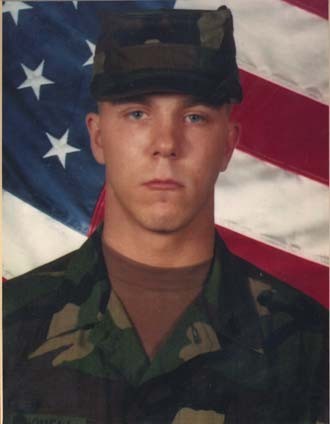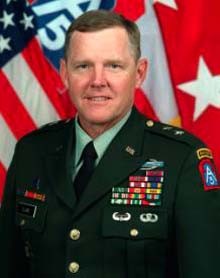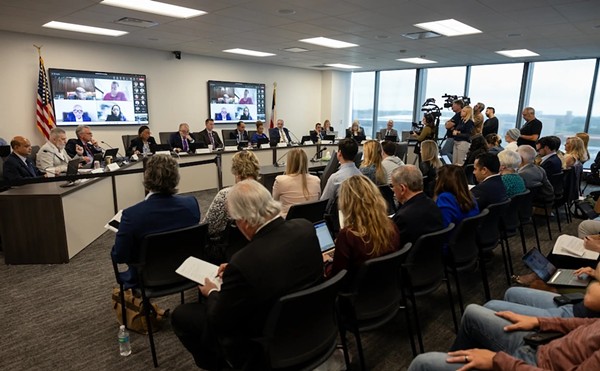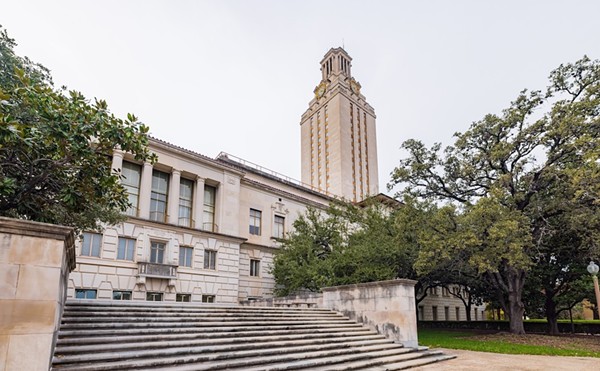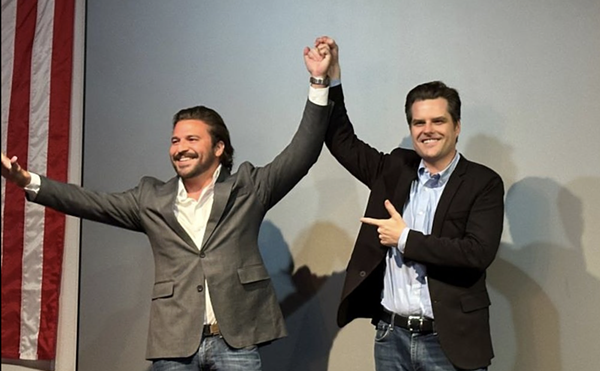Dyslexic, Barry endured taunts from his schoolmates who called him stupid. Beset with Attention Deficit Disorder, he struggled to control his temper. But Barry was neither dumb nor unkind: Although as a child, he couldn't read the directions in a model kit, he could assemble it by himself. He was an excellent pianist, the fastest runner in school, and he loved to climb trees. He invited homeless kids to his house for
After earning his GED and learning a welding trade, in 1997, Barry joined the Army - like his stepfather Wally, his father, and brother did before him - planning to become a helicopter pilot. Yet besides being athletic, generous, and technically gifted, Barry Winchell might have been gay. And in the Army or any of the branches of the service, it's dangerous to be - or to be suspected of being - gay.
President Clinton's controversial "Don't ask, don't tell" policy was supposed to protect gays and lesbians in the armed services, but it hasn't curbed the homophobic hatred and double standards permeating the military. At Fort Campbell, Kentucky, where Barry was stationed until his death in 1999, Major General Robert Clark commanded that base, and, the Kutteles family and other gay/lesbian human rights groups contend, created a climate so hostile to homosexuals that another soldier felt it within his right to beat Barry Winchell in the head with a baseball bat, killing him.
Last year, these groups and the Kutteles family successfully petitioned the Senate Armed Forces Committee to prevent Clark from receiving his third star. Clark now commands the Fifth Army at Fort Sam Houston, and is up for promotion again. `See box, this page.` Since the murder,
| Major General Robert T. Clark |
Barry, 21, had been in the Army less than two years when in the early morning of July 5, 1999, Private Calvin Glover, who had scuffled with Barry earlier that week, slammed a baseball bat into his head while Barry slept on his cot. Glover's accomplice, Army Specialist Justin Fisher, washed the blood off the bat. Suffering from irreversible brain damage, Barry died the next day in Vanderbilt Hospital after his parents removed him from life support.
"He didn't tell us what was going on," Barry's mother says. "When he was in basic training, he used to say 'Suck up and drive on.' That replays in my head that's what I have to continue doing. He dealt with these things himself."
Fisher and Glover, his attackers, believed Barry was gay because of an incident earlier that year; Barry had broken up with his fiancé, and Fisher had taken him to Connections, a Nashville, Tennessee gay dance club. Barry befriended a pre-operative transsexual, and they often went out for coffee. "Barry was lonely," Kutteles says. "I don't think Barry was sure about his sexuality." Barry and his mother often talked late at night about sexuality. "He knew that the sexuality part - whatever he was, it didn't matter to us. We taught him not to be biased and it wouldn't have made any difference. We love our sons and want them to have whatever life they choose to have."
An homicide investigation led to Fisher and Glover, who were court-martialed; Glover received a 60-year sentence in military prison; Fisher cut a plea bargain with Major General Clark - unbeknownst
| Major General Robert T. Clark Deputy Commanding General of operations and training Fifth U.S. Army, Fort Sam Houston A graduate of Texas Tech and Auburn Universities, Major General Clark entered the Army as a second lieutenant in 1970. Before arriving at Fort Sam he had been stationed at Fort Hood, Texas; Fort Lewis, Washington; Fort Benning, Georgia; and Fort Campbell, Kentucky. He served in Vietnam as a platoon leader and as the commander of the Third Brigade, 101st Airborne Division in the first Gulf War. According to the Fifth Army Web site, Clark has received more than 10 medals and commendations, including the Purple Heart. He became a Major General in 1997; last year he was to have received his third star, but in light of the murder at Fort Campbell, several gay and lesbian human rights groups successfully petitioned the Senate Armed Forces Committee to turn down Clark's promotion to Lieutenant General, the second-highest rank in the Army. This year, President Bush has renominated him. Republican John Cornyn of Texas sits on the Senate Armed Forces Committee. To comment on Clark's promotion, call (202) 224-2934. To see the other members of the committee, go to http://armed-services.senate.gov/. |
Two weeks after the murder, Clark sent the Kutteles family a letter, but has never spoken to them.
During the court-martial of Glover and Fisher, sworn testimony revealed that the anti-gay sentiment trickled from Clark to his subordinate commanding officers. Eight months before the murder, non-commissioned officers began an illegal investigation of Barry's sexuality, trying to determine if Barry frequented the gay bar, Connections. One of those officers later improperly asked Barry if he were gay. At least one non-commissioned officer heard Barry receive a death threat - but did nothing; other soldiers, including his company first sergeant, called him "that little faggot;" another private asked Barry in front of their section leader if he was a "faggot," inquiring, "Do you take it in the ass or mouth?"
When two sergeants eventually complained to the company commander, Captain Daniel Rouse, about the harassment, Rouse ignored them. The sergeants also helped Barry file an Inspector General complaint. The IG refused to act on it.
After Barry's murder, an Army Inspector General investigated the climate at Fort Campbell, and according to a task force report, found that, among other examples, "gay joking and bantering occurred among soldiers on a regular basis," and "anti-gay cadences occurred during physical training runs." Anti-gay graffiti was sprayed on public walls: a drawing of a baseball bat with "fag whacker" written on it, and the words, "all faggots in the Army will be killed."
The report also revealed that there was no "don't ask, don't tell" training at Fort Campbell, and most officers and soldiers didn't understand the policy. According to the Servicemembers Legal Defense Network, a legal and policy organization for gay and lesbian veterans and servicepersons, at the time of Barry's death, Clark had never written a policy letter nor issued any public statements regarding harassment of gay soldiers - a requirement of the "don't ask, don't tell" guidelines.
The hatred continued. Two months after the murder, a Staff Sergeant led a unit of soldiers on a training run, singing the cadences, "Faggot, faggot down the street. Shoot him, shoot him 'til he retreats."
"General Clark was in charge of the base and he allowed the atmosphere to exist," says Kutteles, who is again petitioning the Pentagon to deny Clark's pending promotion.
When the Patricia and Wally Kutteles visit San Antonio next week for the American Veterans for Equal Rights Convention, `see section below this article`, they will speak about their son's life, death, and discrimination against gays and lesbians in the military.
"My message will be about patriotism ... and hatred," she says. "That 'Don't ask, don't tell' creates an atmosphere of violence and that the military is the biggest discriminator in the country. We hope it will change as another generation comes in that isn't as biased. People don't realize that gays and lesbians fall in love and want their own relationships. They're the same as everybody else." •
CONVENTION TO FEATURE PARENTS OF SLAIN SOLDIER
Pat and Wally Kutteles, mother and stepfather of murdered soldier Barry Winchell, will speak about their son's life, death, and the pending promotion of Major General Robert Clark at the American Veterans for Equal Rights Convention on Thursday, April 3.
The theme of the conference is "Operation Lift the Ban." "One of our missions is to speak for those who can't speak for themselves," said conference organizer Nancy Russell, a retired Army Lieutenant Colonel who lives in San Antonio.
Although "Don't Ask, Don't Tell" has been in effect for 10 years, many soldiers are outed in the service. "Other people who make comments notice the person isn't dating or don't talk about their personal lives," said Russell. "Sometimes those comments make it to the command level. They're not allowed to ask, but often they still do, or they'll conduct a criminal investigation, find one individual and grill that person to identify others who are gay or lesbian."
Russell said that gay and lesbian soldiers have been subject to a dual standard, particularly in the first Gulf War. "They were supposed to be discharged because of their sexuality, but they were ordered to the Gulf," Russell explained. "And they were told, 'If you survive, then you'll be discharged.'"
Those who are discharged because of being gay or lesbian often endure discrimination in the job market, because the reason for their exit is listed on the long form of their discharge papers - which many potential employers require as part of the hiring process. "That marks them," Russell said.
For tickets and info about the convention, e-mail Russell at [email protected].

